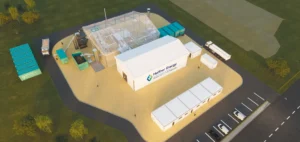The new TotalEnergies site produced its first cubic meters of biogas in January. BioBéarn is located in Mourenx, in the Pyrénées-Atlantiques region and is expected to provide renewable electricity to approximately 30,000 homes per year. The site is expected to produce 160 GWh of ” green ” gas per year, equivalent to the consumption of 32,000 homes. BioBéarn is the group’s eighth methanizer in France and required an investment of 50 million euros. The site will receive 220,000 tons of organic waste and in return generate 200,000 tons of fertilizer products for agriculture. The waste recovered comes mainly from agriculture, of animal or vegetable origin, but also from sludge from wastewater treatment plants or household bio-waste.
The process of transforming waste into biogas
For biogas production, the raw material is heated to 70 degrees for one hour to remove any pathogens such as avian influenza or other viruses. After that, the material is transferred to digesters which, for about 40 days, will stir it and heat it to about 40 degrees. The biogas produced at this time is recovered via a pipe, purified to be suitable for domestic use and injected as biomethane into the network. The digesters also produce “digestate”, a fertilizer product that is reused at the end of the chain by 161 farmers within a 50-kilometer radius, who spread it on their fields, thus reducing the use of chemical fertilizers.
The environmental benefits of the methanizer
The BioBéarn methanizer allows to reduce the use of chemical fertilizers. Mélissa Coton, a farmer in the nearby town of Pardies, recently started using digestate and hopes to reduce the cost of her cereal production. Biogas is also an ecological alternative to fossil fuels. In France, from 2021 to 2022, the quantity of biogas injected into the pipes more than doubled, from 4.3 TWh to 10 TWh. The industry is aiming to produce 25 TWh of biogas by 2030, equivalent to the consumption of 3.5 million homes.
The problems of the implementation of the methanizer
The announcement of the installation of BioBéarn’s methanizer has aroused opposition among the residents of the industrial zone, which has led to a petition that has collected about 700 signatures in 2020. Noise and odors are a concern. TotalEnergies’ biogas manager assures us that the acceptability of the project has been studied and that thresholds have been established to avoid these nuisances. Indeed, a treatment unit, costing 500,000 euros, is planned to eliminate the odors.
The production of biogas injected into pipes in France has more than doubled from 2021 to 2022, from 4.3 TWh to 10 TWh, and the sector is aiming for a production of 25 TWh of renewable gas in 2025 and 80 TWh in 2030. With biomethane, it is possible to green a very large part of the consumption of natural gas in France, which currently represents 25% of the energy consumed, summarizes Olivier Guerrini.






















